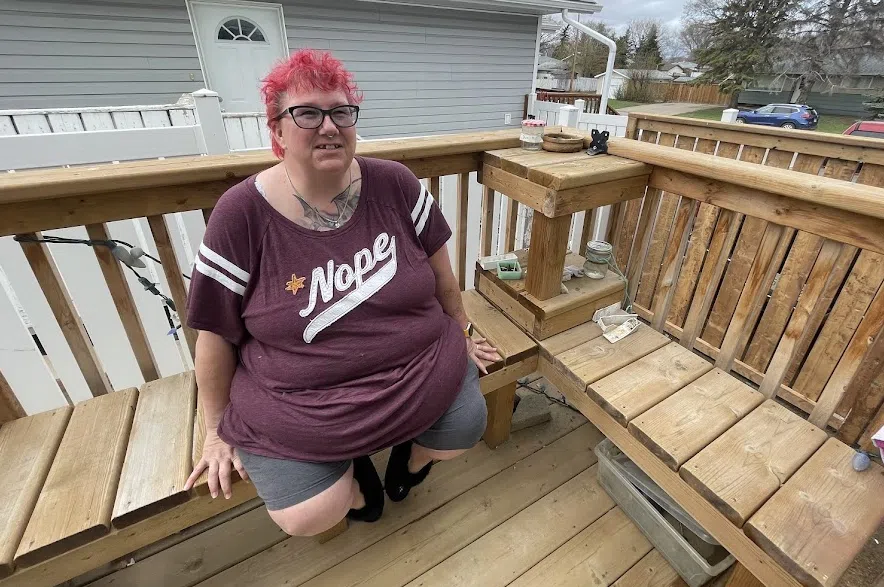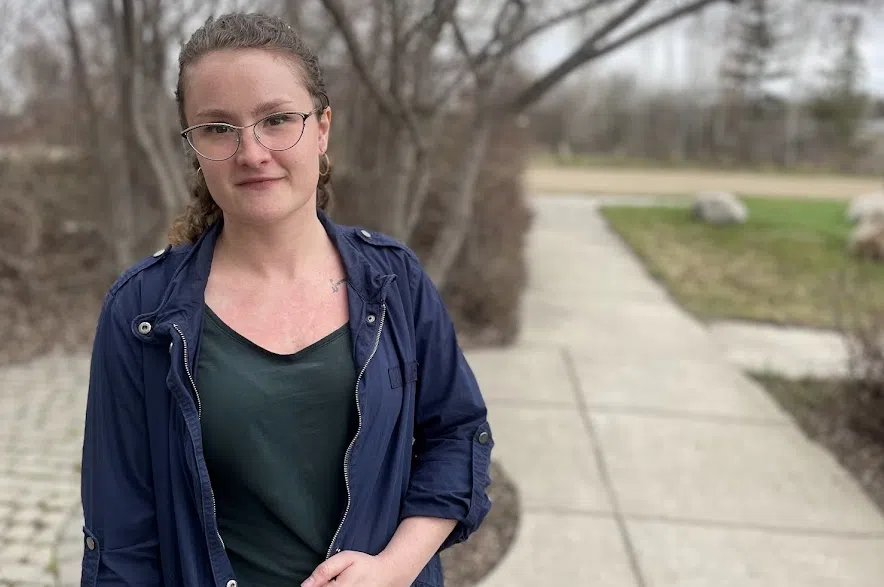For many people, cannabis offers the relief they need to get a good night’s sleep, calm anxiety or relieve pain.
But an increase in roadside testing in Saskatchewan has left many questioning how to consume the substance without picking up a licence suspension the following day.
“There’s a very, very large amount of people that are testing positive for using or having THC in their systems,” said Cpl. Brian Ferguson with Saskatchewan RCMP.
Since cannabis was legalized in 2018, police in Saskatchewan need a reasonable suspicion to administer a roadside cannabis test. While the required equipment wasn’t widely available five years ago, Ferguson said more and more officers are being trained to give these tests.
Darlene Kirstead is a 50-year-old mom of six. She said she uses cannabis at night to treat pain from her arthritis.
“I usually have a nightly routine where I put the kids to bed and I’ll go spend some time on the back step and smoke before I go to bed,” she said in an interview with 650 CKOM.
During the noon hour on April 16, Kirstead said she was waved into an RCMP checkstop on 11th Street West and Avenue W South.
She said the RCMP officer brought a breathalyzer and a cannabis swab to her vehicle, and told her she was being tested for both alcohol and THC.
“I did the breathalyzer and I passed, and then he brought me a cannabis swab and I failed. It was 14 hours since I had smoked last, and I had slept in between there,” Kirstead explained.
Kirstead said she didn’t feel impaired, and the RCMP officer agreed with her.
“He said to me, ‘Do I think that you look or act impaired? Absolutely not, but I have to do what my boss tells me,’” recounted Kirstead.
Lawyer Meagan Ward, a partner at Ward Mischuk Thomson LLP in Saskatoon, said she has represented clients dealing with similar situations.
“If you have someone who has consumed cannabis on a Friday night (and) is testing positive on a Monday morning, what threat to road safety are they, really?” she said.
‘Common misconception’
Kirstead is one of hundreds of people sharing their roadside testing experience in a Facebook group titled “Saskatchewan SGI Cannabis Victims.”
While the process seems murky to some, The Saskatoon Police Service said the law is clear. In Saskatchewan, there is a zero-tolerance law for driving with drugs in your body.
Staff Sergeant Patrick Barbar, who spent more than a decade with the Saskatoon police traffic unit, said there is a common misconception when it comes to roadside testing for cannabis.
“When we do a drug swab for THC, that’s not testing for impairment. You can’t test for impairment with a machine. We’re testing for presence of THC,” he explained.
Watch Barbar explain how the Drager Drug Test 5000 works:
Reasonable suspicion
For entrepreneur Brianna Dodd, the subjectivity of what qualifies as reasonable suspicion leaves too much up in the air.
Dodd said she turned to cannabis a few years ago after pharmaceuticals failed to help her chronic nighttime anxiety and insomnia, and has been able to sleep through the night ever since.
But the fear of being pulled over, coupled with the stigma surrounding a failed test, was enough to push Dodd to stop consuming cannabis.
“I don’t believe that there’s a safe way to consume cannabis if you drive, and driving is such a main aspect of our lives,” the Saskatoon business owner said.
Ferguson said there are many reasons police officers could suspect drug use when it isn’t there, from pink eye causing redness around the eyes to the general nervousness that arises from being stopped by the police.
But, he stressed, an officer’s discretion doesn’t get in the way of the law.
“When we do the test, if you’re just nervous you won’t test positive,” he said.
Although a failed swab test results in a licence suspension and vehicle impoundment, Barbar stressed that it doesn’t necessarily mean criminal charges.
“There’s no charge. There’s no fine levied. It’s all done administratively,” said Barbar.
“People do have the option to file an appeal, and that goes through the Highway Traffic Board, which is an independent board that reviews traffic matters in Saskatchewan,” he said.
But according to Ward, it’s just not that simple.
“It very much feels like this is a situation where, you know, until someone challenges it, we’re just kind of living in this chaos,” she said.
Changing behaviours

Darlene Kirstead, pictured her on her back deck, says she has decided to stop driving after failing a roadside cannabis test. (Alex Brown/650 CKOM)
Meanwhile, Kirstead says she’ll continue using cannabis to treat her pain, but driving isn’t worth the hassle.
“It’s unethical. It’s almost like it feels like being targeted. It’s completely legal, so either it’s legal or it isn’t. Which one is it? It can’t be both,” she said.
The guidelines for driving following cannabis use are murky at best.
Barbar said individual use guidelines don’t exist, and won’t be issued any time soon because everyone’s body is different.
Ward said her best legal advice to users is to be overly cautious.
“People very much need to be cognizant of what they’re putting in their body, how much they’re putting in their body, and making smart decisions before they get behind the wheel, at least until there’s further clarity regarding this legislation,” she advised.
Both Kirstead and Dodd said they want to see a change in the way police test for drugs.
They would like to see a device that measures the amount of THC present, rather than just a pass-or-fail test.











